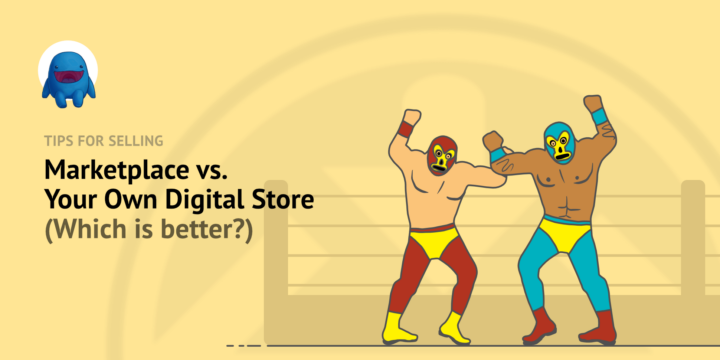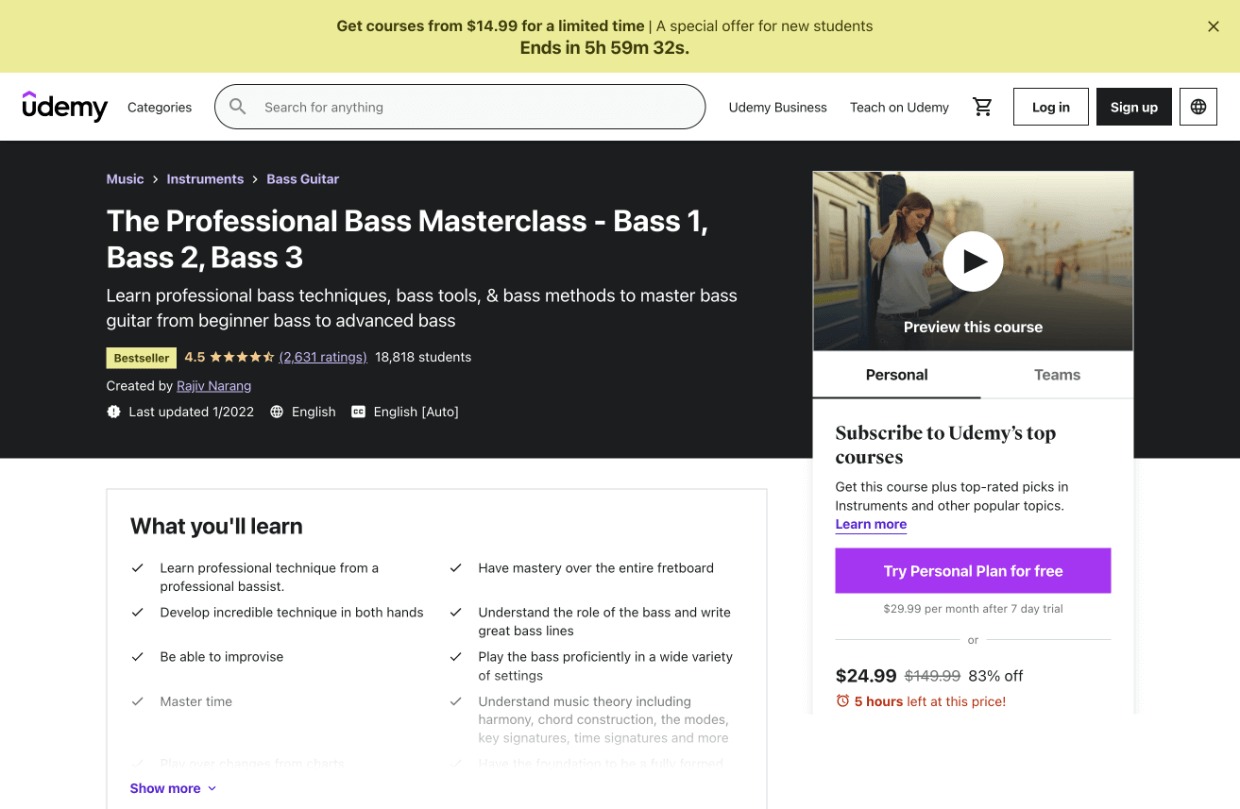
Are you trying to decide whether to sell your digital products on a marketplace vs. your own store? It’s a big decision.
In this article we’ll discuss the pros and cons of both options. We’ll also discuss an unexpected third option!
Last, we’ll show you how to easily set up your own powerful eCommerce store for free (if you have WordPress website).
Let the battle begin! Here’s what we’ll cover, feel free to skip around:
- What is a marketplace?
- Marketplace: pros and cons
- Your own website: pros and cons
- Which one should I choose? 🤷🏽♀️
- A third option
- How to easily make your own eCommerce website
What Is A Marketplace?

Online marketplaces are websites (or apps) where you can purchase products from multiple sellers or sources.
It’s a very popular eCommerce business. Popular marketplaces include huge retailers like the old-school original eBay, the world-dominating Amazon, and huge niche-of-niches site Etsy.

Marketplaces are one-stop-shops where you buy stuff from unseen providers, often called ‘vendors’. Those vendors are paid a cut (or commission) of the sale.
Why Use a Marketplace?
If you’re creating digital products (aka digital downloads, downloadable products, or virtual products) you might list on a marketplace for two main reasons:
- It’s easier and faster than setting up your own website
- You get access to an existing audience (one that may be prepared to buy your type/s of product)
There are many pros and cons of being in a marketplace. Let’s think them through…
Marketplace: Pros and Cons

It’s easy and fast to get started on a marketplace, but be sure to think through the downsides.
| 🟢 Marketplace Pros | 🔴 Marketplace Cons |
|---|---|
| Marketplaces already get traffic to their site. This may make it easier for you to find an audience (but there’s no guarantee, they are sometimes crowded and noisy places). | Listing fees. They take a cut of your revenue. The more you make the more they take. You still also pay credit card fees on most marketplaces. |
| It’s easier to list on marketplace sites than build your own website. | There is no way to directly communicate with ‘your’ customers (or potential customers), some marketplaces go so far as to forbid it. |
| You may be able to build an audience more quickly. | Therefore, ‘your’ customers are not your customers. They are marketplace customers. |
| You can test improve you new/MVP (minimally viable product) with your first few customers. | Your downloads are surrounded by competing products and distractions outside of your control. |
| You can get help from a customer support team (at least in theory). | Upselling or cross-selling not available (or very limited, and not limited to your own products). |
| No way to follow up with ‘your’ customers after purchase, you may want to help them succeed (sometimes called onboarding) but may not be able to. | |
| No control over the customer experience (brand, checkout, look and feel). | |
| You have to follow their terms of use, which can change at any time. | |
| Many marketplaces have limitations on what prices you can charge for your own products. |
Your Own Website: Pros and Cons

Building your own website might sound hard, and it is harder than simply listing on someone else’s website. However it’s a ton easier than it used to be.
To get eCommerce functionality used to require a developer and much time and money. Not anymore. You can sell online with no custom coding.
Let’s weigh out the pros and cons.
| 🟢 Your Own Website Pros | 🔴 Your Own Website Cons |
|---|---|
| Higher profit margins (at least in the long run). You get to keep all of your revenue (minus transaction fees). | Setting up your own store is more work than simply listing on a marketplace |
| Full control of the brand, voice, messaging | You’ll have to find ways to attract visitors (traffic) to your website |
| Full control of the shopping and checkout experience | It may take more time |
| Your downloads aren’t surrounded by competitors and distractions | You are responsible for maintaining and securing your website (you can choose a managed web host to take care of all that for you) |
| Communicate directly with your customers (and potential customers) | |
| Upsell and cross-sell | |
| More control of your overhead expenses |
Which One Should I Choose?

It’s hard to know. You have to decide for yourself. But we have a tip and questions you can ask yourself.
Pro tip: Marketplaces are generally better for beginners and side hustlers. Your own eCommerce site is generally better for serious business owners.
Ask yourself:
- Am I starting a business or making a little money on the side?
- How much time do I have to dedicate to this?
- What kind of lifestyle am I going after?
- Am I ready to handle having my own website?
- Do I care if I am giving away some of my profits?
- Is convenience more important to me, or is independence and profitability most important?
- What are my 3-5 year plans?
- What kind of niche or market segment am I going after?
- Bigger clients and corporations may not take your product seriously if it doesn’t have its own high-quality website. They may not like buying from a third-party (the marketplace).
- It’s hard to charge higher prices on a marketplace. Sometimes the marketplace even sets limits.
- Smaller clients are more price conscious and less quality conscious. On the one hand they don’t mind your product being on a marketplace. On the other hand, they aren’t willing to pay a higher price.
Business Owner Responsibilities
When you start thinking about owning an online business you’re going to have to think about the new responsibilities you’re taking on.
- Legal policies (terms of use, privacy)
- Customer support
- Refunds
- Website hosting
- Design
- Site maintenance
Remember that all those items listed above are easier to do now than they were a few years ago. And it’s likely to get easier and easier as technology improves.
Running your own store can be extremely rewarding. You can build a name for yourself with complete independence!
Smart entrepreneurs know that they can only get so far selling their own products on someone else’s website.
Sample Use Case
How does this work in the real world? Let’s look at an example.
Pretend you want to sell online courses about playing bass guitar. Do you want your first impression to be on your own cool digital storefront or on a bustling marketplace?
Here’s a bass class on the popular online course site Udemy:

And here’s one of the nice product landing pages from EDD user BassBuzz:

Which one is more your style? What are your goals?
- It’s probably easier to get started on Udemy, but is that the kind of web presence you want?
- That BassBuzz site looks pretty rockin’, but are you ready and willing to put in that kind of work?
Consider the pros and cons. It depends on what you want and where you are on your business journey.
A Third Option

There is a third option. We call it coexisting.
You can have your own store and list on a marketplace/s.
When and why would you do this?
You could temporarily coexist when:
- You’re first building your product/s and brand. Marketplaces can be helpful in getting brand recognition started.
- You transition to independence. While you are getting your domain name set up, established on search engines, and developing your marketing strategy.
In some cases, you might even coexist permanently:
- If you have many different products, offer a small selection on the marketplace, and redirect customers via email marketing to your online store for the full catalog or upgrades (possibly with discount codes).
- Do your products have a path for upselling or cross-selling? Have your base-level product available in both places, while upselling or cross-selling on your website, possibly with discount codes.
It can be a good strategy to do both! Two sales channels can be good.
⚠️ Remember, some marketplaces do require that you only sell on their eCommerce platform.
How to Easily Make Your Own eCommerce Website

If you are selling digital products, the best way to go is WordPress and Easy Digital Downloads (EDD).

Why WordPress?
WordPress is the best website builder. It’s the technology powering more than 43% of the internet. No other web technology powers even 5%.
You can trust it to be your ecommerce platform and more. That last part is important. You never quite know what you’ll need your website to do in the next year or two.
WordPress has the largest ecosystem of themes (templates), plugins, and professional services providers. It has integrations with just about every technology you can think of.
You can trust that it will be able to grow and adapt to whatever your business needs…now and later.
Control and Freedom
You also have full control and freedom over your data with WordPress. Marketplaces tend to be closed. They limit what you can do. WordPress is open source. Do whatever you want with the platform. Own all the data.
🤷🏾♂️ Don’t have WordPress. No problem. You just need a good web host. Click here for a guide on choosing one. There are discount codes too!
Why EDD?
EDD is one of the most trusted WordPress plugins available. More than 50,000 businesses, big and small, rely on it for selling online.
We use EDD too! Easy Digital Downloads is a powerful way to build a full featured ecommerce website. No custom code required.
Why Not Other Ecommerce Platforms?
Online shopping is a big world, there are many options. The downside of many other websites, services, and platforms is that they are not designed from the ground up to sell digital downloadable products.
WooCommerce, BigCommerce, and Shopify are powerful platforms. But they are all designed for physical products. With them, tools for selling digital products are an afterthought. A bolt-on addition.
You’ll waste time setting up (or disabling) shipping, logistics, and inventory tools you don’t need. Some solutions even require paid add-ons to sell digital or virtual goods.
- If you are selling mostly physical goods, WooCommerce is a good option. It’s built on WordPress so you get all the advantages that WordPress has to offer. There are ways to use it for free.
- Shopify and BigCommerce only offer a free trial. EDD has a free forever version. EDD Passes start off at lower annual prices than their more expensive monthly fees.
EDD FTW
EDD is purpose-built for digital creators selling digital files or digital goods. It lets you get started selling your digital products for free.
EDD has a free version, not a free trial.
Here’s what the free version includes:
- Protected product files, only paying customers will have access to your digital downloads
- Unlimited product pages
- Customizable product listings
- Full control over pricing
- Complete control over the customer experience and branding (white label)
- Shopping cart with payment options
- Flexible checkout options
- Discount codes
- Works with any WordPress theme (template)
- Customer management (basic CRM)
- eCommerce reports
- Stripe and/or PayPal payment processing:
- Accept credit cards with Stripe and/or PayPal
- Accept Apple Pay and Google Pay with Stripe
Why wait? Get started now with no risk. It’s all self-serve and a click away.
Using WordPress and want to get Easy Digital Downloads for free?
Enter the URL to your WordPress website to install.
Need More? Add More!
EDD is free to use forever. As your business grows, however, you may need to add more functionality to your store. EDD lets you use and pay only for what you need.
Grab an EDD Pass to add features like:
- Email marketing integration
- Subscription (recurring) billing
- Software licensing
- All access / product bundles (unlimited access to all products or certain product categories)
- Product reviews
- You can even make your store into your own marketplace with Frontend Submissions. 😈 Boss move.
Goin’ Your Own Way? Here’s Where To Start
If you’ve decided you want to sell on your own terms, great! We’re ready to help you.
- 🪧 Here’s a guide to moving/migrating off your marketplace. We’ll skip you down to the first step you need to take!
- 🏁 Check out our quick start guide for getting your new product set up for selling with EDD
Marketing Tips
Remember, one central challenge with running your own website and store will be getting visitors to come to it. What do you do!?
- Blog – Writing search engine optimized (SEO) posts is a proven way to get potential customers to visit your site. Check out our post with easy ways to promote your products on your blog.
- Use social media – Spread the word, often for free, on Facebook, Instagram, LinkedIn, Twitter and other platforms that are suited to your product. Check out our tips for effective social sharing.
- For more suggestions – Read the last section of our moving/migrating guide.
Conclusion
Good stuff! You’ve weighed the pros and cons of whether to sell your digital products on a marketplace vs. your own store. You know how to build your own ecommerce shop. You’re even equipped to go your own third way.
We hope we’ve helped you today as you scale up a profitable online business that empowers others!
We have a lot more resources for digital creators like you. What do you want to learn about next?
- 🏁 Product Ideas You Can Start Right Now
- 🤑 The Astonishing Benefits of Selling Digital Products
- 📈 The Most Popular Downloads To Sell
- 📚 The Complete List of Digital Product Ideas
Be sure to subscribe to our newsletter or follow us on Facebook and Twitter to get our latest resources for digital creators.
Using WordPress and want to get Easy Digital Downloads for free?
Enter the URL to your WordPress website to install.
Disclosure: Our content is reader-supported. This means if you click on some of our links, then we may earn a commission. We only recommend products that we believe will add value to our readers.